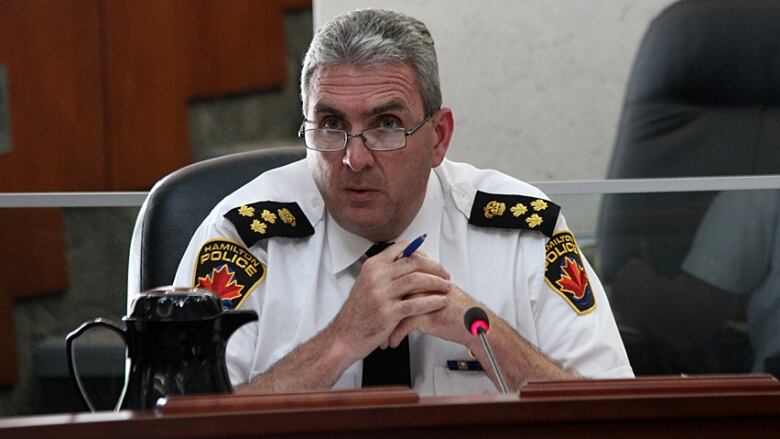Police board wants answers after 'eye-opening' street check report
Board will look into keeping race data for tracking bias
Hamilton Police Chief Glenn DeCaireagreed Thursday to give answers next monthabout the service'son-the-street policing tactics in response to concerns raised about privacy and racial bias.
The police service's oversight board asked for the answers after hearing from a Hamilton activist who painted a picture of "innocent and law-abiding people being stopped, questioned and asked for identification."
That practice, which activist GaryFondevillareferred to as "street checks,"is no different than controversial "carding" in Toronto that has been shown to disproportionately impact low-income people and visible minorities, he said.
"Carding allows too much room for personal bias,"Fondevillasaid. "It goes against our Charter rights."
Members of the board called the presentation "eye-opening" and "compelling."
DeCaireacknowledged the existence of racial profiling in policing. Hesaid the service does "not train our members to participate in the random, indiscriminate stopping of persons based on race or any other prohibited ground for the purpose of identifying individuals."
'Moved a couple of things forward today'
The activists said the meeting outcome wasprogress in a back-and-forth they've had with the service for months, but said they remain skeptical the chief's presentation a month from now will address their concerns.
"We've moved a couple of things forward today," said HalimaHatimy, a member of the "Black, Brown, Red Lives Matter" group.
In a presentation,Fondevillaasked the service to do the following:
- End street checks/carding.
- Do yearly studies on experience of community members interacting with police.
- Issue carbon copy receipts including the badge number of the officer who stopped a person and a race category to facilitate tracking racial profiling.
- Increase the racial diversity of sworn officers.
- Implement lapel cameras.
The board asked for the chief to return to its next meeting with a report on what it would look like to keep race data, and to address the concerns raised Thursday.
DeCairesaid he'd give an overview of the training officers get, the laws that govern their interactions with people on the street, the "articulable cause" for street stops and what information is collected and recorded from interactions with citizens on the street.
'Multiple definitions based on who is doing the talking'
DeCairedid not clear up semantic confusion about what the service's"street checks" are.
When you ask the chief, 'Do we card?' He says no.- Mayor Fred Eisenberger
He said there are "multiple definitions based on who is doing the talking" of the "street checks" term, even though Hamilton Police includes the category in its statistics and said it did between 3,500 and 5,500 "street checks" between 2010 and 2013.
A 2012 Toronto reportdrew a direct link between "street check" practicesin other Ontario police departments and "carding" in Toronto.

"This is where there are definitions that will come forward for the board to entertain at the next meeting as we have committed to," De Cairesaid. "And what we are going to do is we'll clarify at that point all of those issues for us."
Mayor Fred Eisenberger, who sits on the board, said he would take issue with information being recorded from street interactions "without just cause." But said he generally accepts the chief's description of what's going on.
"To be fair, when you ask the chief, 'Do we card?' He says no," Eisenberger said. "Is it incumbent on us to dig deeper and find out what the police do on a day-to-day basis? In a general sense, I think the chief has told us what they do on a day-to-day basis and it's a lot of interaction in the community, but not targeted at individuals for any specific reason unless there's a crime occurring. So, I take him at his word on that."
'If we're trying to build trust in this community'
If the police service formally includeda race identifier in all of its records of street interactions, it could then analyze them to see if one race was impacted more than another across the city.By collecting the race identifiers, police can establish a baseline for how much or how little race seems to come into play in whom they stop.
Coun. Terry Whitehead, who sits on the board, said he thought it would help mend some of the "distrust" that he said can creep into the relationship between police and the community.
"The fact we're not collecting that, if we're trying to build trust in this community, a good start is to start collecting that kind of data," he said.
If we're trying to build trust in this community, a good start is to start collecting that kind of data.- Coun. Terry Whitehead
Eisenberger said the collection of race data seemed "counter-intuitive" after hearing the community concerns about racial bias. DeCairesaid a "measured approach" would be required.
He said that issue and others, like issuing receipts for street interactions, would be part of a conversation with the province about new regulations.
Madeleine Levy, a civilian member of the board, said she is wholeheartedly opposed to carding. "I understand that Canadian law does not tolerate fishing expeditions and neither do I," she said. But, she said, the police must have power to do intelligence-based investigations.
Catching up on this discussion in Hamilton?
Here are some links to previous coverage:
- Hamilton police collecting information on people not accused of crimes
- Hamilton Police do 10 to 15 street checks a day
- Hamilton police street checks linked to carding by Toronto report
- Activists looking to put street stops on public agenda
- Police street stops: Making the case for keeping race data
- Hamilton Police: 'You have the right to walk away'












_(720p).jpg)


 OFFICIAL HD MUSIC VIDEO.jpg)
.jpg)



























































































